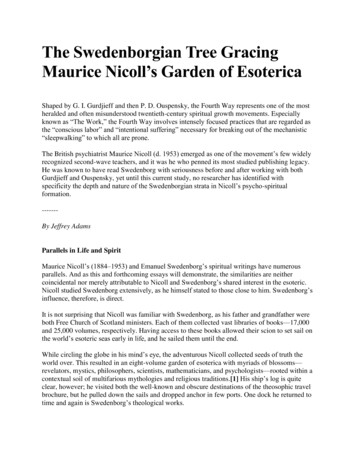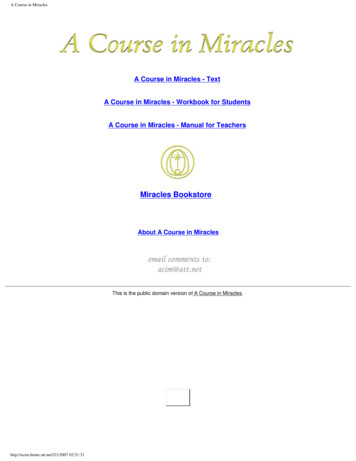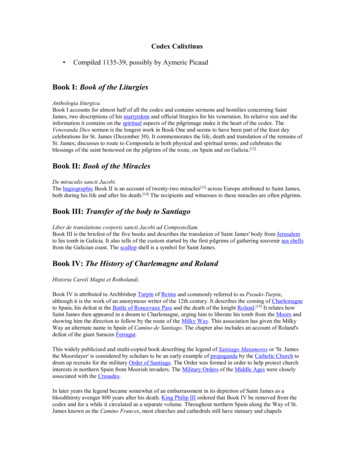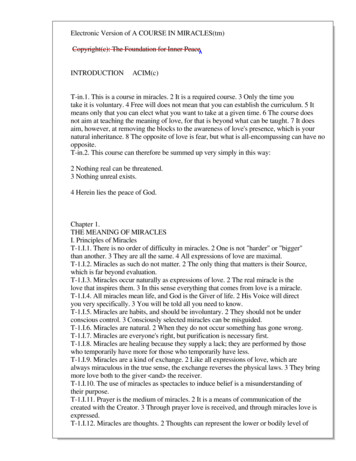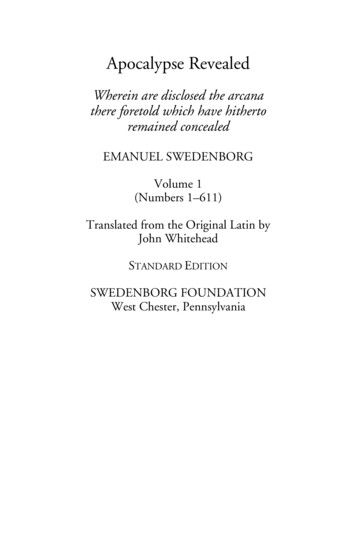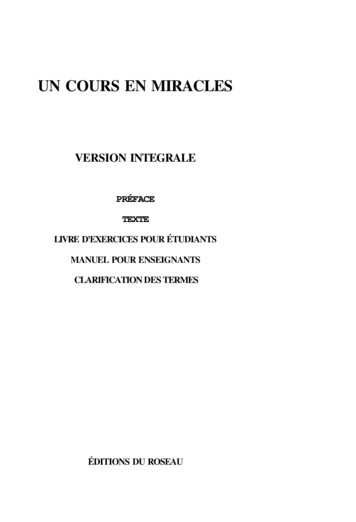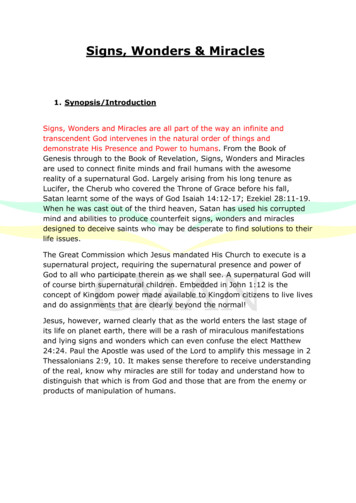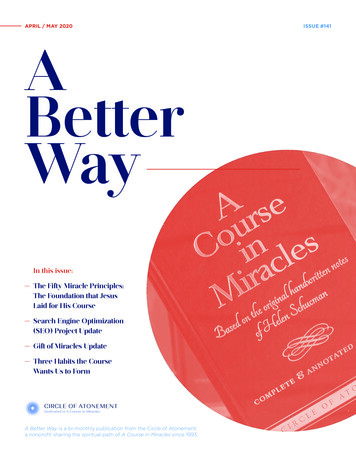
Transcription
12 Miracles ofSpiritual Growth
12of SpiritualGrowthA Path of Healing fromthe Gospels\Swedenborg Foundation Press West Chester, Pennsylvania
2012 by the Swedenborg Foundation. All rights reserved.No part of this publication may be reproduced or transmitted in anyform or by any means, electronic or mechanical, including photocopying,recording, or any information storage or retrieval system, withoutprior permission from the publisher.Library of Congress Cataloging-in-Publication DataRogers, E. Kent.Twelve miracles of spiritual growth : a path of healing from the Gospels/ E. Kent Rogers.p. cm.ISBN 978-0-87785-343-5 (alk. paper)1. Jesus Christ—Miracles.2. Bible. N.T. Gospels—Criticism, interpretation, etc.3. Spiritual healing. I. Title.BT366.3.R65 2012232.9’55—dc232011044226Edited by Morgan BeardDesign and typesetting by Kachergis Book DesignThe scripture quotations contained herein are from the New RevisedStandard Version Bible, copyright 1989 by the Division of ChristianEducation of the National Council of the Churches of Christ in the USA,and are used by permission. All rights reserved.Printed in the United States of AmericaSwedenborg Foundation Press320 North Church Street West Chester, PA 19380www.swedenborg.com
To Shovha, with whom Igratefully share the road ofgrowing and healing.\Many thanks to Morgan Beard for her expert postsubmission editing of this book and to Valerie Rogersfor her pre-submission editing. I would also like tothank my parents, Ned and Val Rogers, for their earlystage editing, as well as my wife, Shovha, and childrenAlisha, Amrita, Avia, Chandra, Evan, Ganesh, Nick,Pasang, Puja, Rajendra, Santosh, Sharmila, and Sunita,for assistance with more recent editing of my life.
ContentsIntroduction1 Healing from Feelings of Unworthinessix3Matthew 15:21–282 Healing from Lack of Forgiveness17Mark 2:1–123 Healing from Spiritual Slavery32Mark 5:1–204 Healing from Inner Warfare56Mark 5:21–435 Healing from Lost Innocence73Mark 5:35–436 Healing from Doubt84Mark 9:14–297 Healing from Faith-ArroganceLuke 7:1–1098
8 Healing from Lack of Joy112Luke 17:11–199 Healing from Fear127 Matthew 26:51–54; Mark 14:46–52;Luke 22:49–51; John 18:10–1110 Healing from Spiritual Apathy143John 5:1–1411 Healing from Blame-Blindness154John 9:1–4112 Resurrection from Spiritual Death171John 11:1–44Appendix: Meditation195About the Cover Photo209
IntroductionAll the miracles the Lord himself performed when he was in the worldsymbolized the future state of the church. For instance, the eyes of the blindand ears of the deaf were opened, the tongues of the mute were loosened,the lame walked, and the maimed and leprous were healed. This meant thatthe kinds of people symbolized by the blind, deaf, mute, lame, maimed,and leprous would receive the Gospel and be healed spiritually, throughthe Lord’s coming into the world. —Emanuel Swedenborg, Secrets ofHeaven §7 337I started writing this book after having looked deeply at a few ofJesus’s healings. I found that the more I delved into these accounts,the more meaningful and personally therapeutic they became. I discovered that Jesus could heal me of spiritual problems today just asmiraculously as he healed the physical problems of men and womentwo thousand years ago. Several times I felt the Lord reaching outthrough the text and through thousands of years, touching my heartand healing me. I saw that Jesus knows me, and all of us, in an intimate way. He knows about our fears, upsets, struggles, and hangups, and he answers us with the utmost compassion. I felt stronglythat the healing I was receiving would be applicable and useful toothers as well. I had to share what I had been given.As the title implies, Twelve Miracles of Spiritual Growth exploresthe curative spiritual and psychological message contained in twelveix
of Jesus’s healing miracles. I believe that this book is highly relevantto any Christian seeking a deeper, more meaningful relationshipwith Jesus. It will also appeal to the thoughtful spiritual seekersearching for spiritual solutions to psychological problems.I have many non-Christian loved ones, and as this book drewnear publication, I experienced some trepidation lest I alienate themby the boldness of faith I profess. So for them and for those otherreaders to whom faith in Jesus as the manifestation of Divine Loveis a foreign or even off-putting idea, I wish to state the following. Ibelieve in Jesus because I have found this belief to increase my desireand ability to love others. Faith is often criticized as divisive. I believe, not to separate myself from nonbelievers, but to be united withall people, regardless of faith, as my brothers and sisters. If there isanything of my faith that hinders my ability to have empathy with, relate to, or serve others, than I reject it as an erroneous aspect of faith.I also feel a measure of foolishness in believing the antiscientificstories through which the life of Jesus is expressed—the virgin birth,the healing miracles, the resurrection, and even the idea that a man isGod. Nevertheless, if belief in such stories is able to make me a betterperson—a more loving husband, a gentler father, a more trustworthy friend—then I am willing to subordinate logic and the desire forrespectability to the goals of love. It is, in the end, exhilarating andliberating to have my life and, indeed, reality defined not by intellect,but by love. And ultimately, in my mind, that which increases love isthe definition of logical. If something has a true and good effect inmy life, then that thing, even if it appears fanciful, must be true andgood. I’ve only ever found one thing as true and good as Jesus, andthat is love itself; and for me, there is no difference between the two.Jesus explains to me how to love and Jesus inspires me to love beyond the borders of what I could otherwise have hoped for. Finally,Jesus grounds me. I marvel at people who love others well and simply without faith. I do not believe I am capable of this. Were I notable to point to Jesus as the source of love, I’d take credit and any loveexpressed would become adulterated with self-aggrandizement.xI ntrod uc ti on
Who is Jesus, and what does faith in Jesus mean? Because thisbook is founded on stories about Jesus, these are important questions to answer. What is behind the words “I believe in Jesus”? Tobelieve in something or someone, we must know their fundamental message and quality. Jesus twice expresses his message verbally:“This is my commandment, that you love one another as I haveloved you. No one has greater love than this, to lay down one’s lifefor one’s friends” ( John 15:12–13). He also states in the verses thatfollow that those who truly believe will live according to his commandments of love. In my mind, therefore, to believe in Jesus is todedicate one’s life to the effort of loving and serving others. Jesusdidn’t just preach this message, he lived it out in everything he did.Heaven, Jesus says, is within. It is a spiritual state of mind. Loveis the only source of lasting peace and true joy. I will use the word“love” frequently throughout this book, and since that word has somany diverging implications, it seems best to define the meaning Iintend to communicate. Love is the essential nature of God, whichwe experience in several ways. When we are inspired by a heartfelt desire to bless others, to render them happy and improve theirwell-being, and when we feel genuine gratitude for the existenceof others, that is one manifestation of Divine Love. I would equatethis with the Holy Spirit; it is God’s work and animation within us.So when I say that love is the heavenly state of mind, that is what Imean.The activities that arise from that state of mind—the things wedo from a heartfelt desire to improve life on earth and bless others—are a second manifestation of Divine Love. Only Divine Lovecan animate us to such selfless activity.A third manifestation of Divine Love is Jesus—his life, his words,and his actions. God’s love for the human race became incarnated asa Savior. Jesus is God and God is Love—all that Jesus ever said or didis the revelation of Divine Love. For this reason, I sometimes referto God as Divine Love or simply Love. I do so when I mean to emphasize the immediate presence of God as love within human lives asI ntrod uc ti onxi
opposed to intellectual knowledge and thought about God, which bynature distance us from the experience of God’s immediate presence.Love is what makes us truly human. In the absence of love, we aremerely animals, biological machines. But love forms us into spiritualbeings, transcending our self-serving, animal instincts. Love is morehuman than we are. Thus Divine Love, or God, is what is truly human and so authors our humanity. As our creator, Divine Love isnot only human, but love is also divine. Were there no such thing aslove, there could be no joy. Without joy there is no consciousness.Without consciousness, there is no reality. Thus Divine Love—whomanifested as Jesus—is the source of all joy, all consciousness, andall reality. Because Divine Love is the source of consciousness, it isalso the source of all intelligence. Therefore Divine Love is intelligence itself. Love is God, living and intelligent, both fully humanand fully divine.Love is heaven. Faith in Jesus delivers us into heaven becauseJesus inspires selfless love, something that the self logically cannotachieve on its own. It is impossible for the self to transcend itself.Some repeat the idea that Jesus died for our sins. I believe that hedied for our sins in the sense that he loves us even when our selfishness tries to block love from dwelling within us. In other words, oursins attempt to kill God’s love, but Divine Love is willing to keeploving us anyway. And indeed that endless, steadfast mercy is oursalvation. Faith is saving because it is the necessary bridge that allows us to aspire to a life in accordance with the will of Divine Love.Since such intelligent, human Divine Love exists, it only makessense that such a being would wish to contact us. Ironically, in theslow and halting development of my faith, the miracles of Jesus werepreviously uninteresting to me. I didn’t want to base my faith on abelief in miracles. Rather, I first accepted Jesus as my personal Godbecause of the value I found within his message. Nobody’s messageis so clearly true and good—love one another. He spoke the messageI was willing to believe. I concur with what guards once said of him:“Never has anyone spoken like this” ( John 7:46). Because I couldxiiI ntrod uc ti on
believe in his message, I decided to believe in him. And so when hesaid, “Before Abraham was, I am” ( John 8:58), I understood that theone who delivered this profound message was saying that he wasalso God.That was many years ago. Since then, my faith has slowly butsurely increased and filled out. What was at first a simple intellectualdecision to believe in the man who spoke about love developed intoan increasing trust of the heart. My ability to feel God’s love andpresence in life around me has steadily grown through the years.When God is felt all around, it is much easier to let go of fear andthe selfishness it breeds. By relating to my Savior, I become a betterperson. He heals me and lifts me up. Since to transcend the self bymeans of the self is an impossibility, to be able to, little by little, transcend normal, natural, selfish instincts is the miracle of Jesus’s love.While at first I found the written accounts of Jesus’s miracles lessmeaningful, when parallel miracles began to occur in my own life, Iwas astounded and my faith was amplified. Jesus himself says, “Believe the works that you may know and understand that the Father isin me, and I am in the Father” ( John 10:38). I see and appreciate theworks that he brings forth in my life.Apart from intensive study of the New and Old Testaments, theideas in this book were also influenced by a number of other important factors. Understanding the Word of God as a parable or analogyof our personal spiritual development in our walk with the Lord isa concept thoroughly developed by the eighteenth-century mysticand theologian Emanuel Swedenborg, whose works I have read extensively. Similarly, other underlying theological ideas within thisbook, such as the singular personhood of God whose manifestationis Jesus and the inseparable nature of faith and love, are themes thatSwedenborg discusses.The value of working with others in groups for spiritual and psychological purposes is something I have experienced firsthand in avariety of contexts. I have had the privilege to gain the wisdom andblessing of all manner of individuals through Christian Bible studI ntrod uc ti onxiii
ies, prayer groups, recovery groups, spiritual growth groups, andpsycho-spiritual camp group encounters for many years. There is nodoubt that these positive and sometimes life-changing experiencesprofoundly influenced the format of the practice espoused withinthis book. Though I wrote this book before my education in mentalhealth counseling, I have since edited in a few ideas gained from thatexperience.This book assembled itself piecemeal, chapter by chapter, as Icame to see a message within each healing miracle. I chose the healings to meditate and write about randomly, without any particularorder in mind. After reading each healing account, I would spendtime in prayer and meditation. I also used Bible dictionaries andother reference books to learn more about customs, historical details, and the uses of various items mentioned. I used Strong’s Concordance to learn the meaning of names and words. Sometimes thepersonal, spiritual message of the healing came quickly, sometimesslowly.I chose to write about those healings that included the mostamount of information. Sometimes the Gospels tell us that “all whotouched him were healed.” This is good news, but it lacks detail andso does not
I started writing this book after having looked deeply at a few of Jesus’s healings. I found that the more I delved into these accounts, . readers to whom faith in Jesus as the manifestation of Divine Love is a foreign or even off-putting idea, I wish to state the following. I believe in Jesus because I have found this belief to increase my desire and ability to love others. Faith is often .
